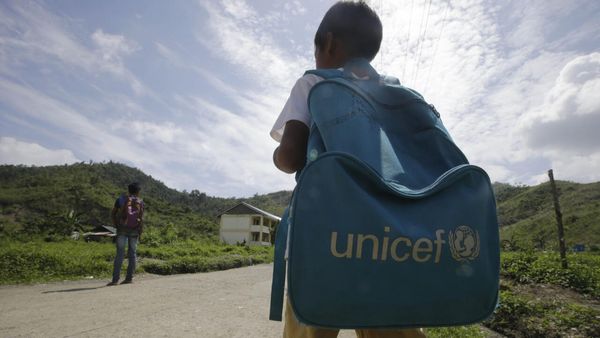
After three months of living in her new home in Chicago, Safia is struggling to figure out how to navigate the U.S. immigration system.
Safia, 30, fled her native Afghanistan in August after the Taliban seized political power. She thought her work to empower women in Afghanistan tied to the U.S. made her eligible for a Special Immigrant Visa, but she later learned she will likely have to apply for asylum.
“Most of the people don’t know about this process,” said Safia, who asked that her full name not be used because her family remains in Afghanistan. “They just think that, OK, U.S. helped us to come to America, that’s it and they’re happy with that. They don’t know that the next process that you have to apply for your (immigration) case and you have to have a lawyer to defend you.”
The uncertainty around her immigration status is one reason why she and others say that the newly arrived Afghans need more legal and financial assistance as they settle in Chicago. Another recently arrived Afghan said he is having difficulty figuring out how to pay rent after he moved to Chicago from his original resettlement city.
As of Feb. 1, more than 1,890 Afghans have resettled in Illinois since last fall’s evacuations in Afghanistan, according to the Illinois Department of Human Services. Another wave of Afghans — about 400 — are expected to arrive this month in Illinois. In total, there could be up to 3,000 Afghans who end up calling Illinois home.
The number of arriving refugees is a sharp contrast to how many people the United States welcomed during former President Donald Trump’s administration. From October 2018 to September 2019, Illinois resettled 1,005 refugees, including 18 from Afghanistan, according to data from the State Department.
In the Chicago area, the government is partnering with at least two community organizations — the Muslim Women Resource Center and the Arab American Family Services — to resettle 200 Afghans in February to alleviate traditional resettlement agencies. Those agencies are also tasked with resettling 1,704 incoming refugees from other parts of the world, according to the Illinois Department of Human Services.
Afghans who worked with the U.S. government and arrived with Special Immigrant Visas can apply for permanent residency, said Lia Kim-Yi, the director of immigration law practice for the North Suburban Legal Aid Clinic.
Those who arrived in the U.S. through humanitarian parole can live in the U.S. lawfully for a year, she said. The legal aid clinic is working with the Muslim Women Resource Center to assess if Afghans who arrived under this status are eligible for a Special Immigrant Visa, asylum or another form of relief to stay in the country longer, Kim-Yi said.
In West Ridge, RefugeeOne went from resettling almost no one each month to hundreds in a month, said Jims Porter, communications and advocacy manager. Since late September, the resettlement agency has welcomed more than 400 Afghans, Porter said. In fiscal year 2018, the agency resettled 175 refugees, according to a past annual report.
RefugeeOne added more than 20 workers to try to keep up, Porter said.
“The resettlement infrastructure was really torn apart during the Trump administration,” Porter said. “And so it’s taking us time to rebuild that infrastructure and make sure that we are back up to staffing capacity, and that we have the appropriate interpreters and translators and cultural advisers.”
Nan Warshaw, who founded the community-based Refugee Community Connection, said volunteers across Chicago helping the newly arrived Afghans have crowdsourced everything from groceries to furniture to figuring out the complexities of government benefits.
“We are trying to fill the gaps where the resettlement agencies aren’t able to provide,” Warshaw said. “We have always done that, but now there are so many more people and those gaps are so much more wider.”
/cdn.vox-cdn.com/uploads/chorus_asset/file/23221584/merlin_103583716.jpg)
The group has tried to help Ishaq, who fled Afghanistan with his wife and two young children. His family moved to Chicago to be closer to a friend after the government originally resettled him in Pennsylvania, where he knew no one.
When he arrived in Chicago, his caseworker in Pennsylvania stopped answering his calls, he said through a translator. Another person he had met in Pennsylvania eventually helped him get his work permit after numerous calls. Now, he’s having trouble navigating everything else, including getting medical care for his young children.
The apartment the family is living in was obtained through his friend, who paid some of the rent as a loan, Ishaq said. He now worries about how to pay back his friend while also keeping up with the family’s expenses.
Cheryl Dahle, a volunteer who has been helping Ishaq, said she and other volunteers have been trying to raise money to help the family.
“There are very rigid rules around how this resettlement process is supposed to work,” Dahle said. “And when those rules get violated by accident or for good reason or whatever circumstance, the consequences are fairly dire.”
Securing permanent housing for the newly arrived Afghans remains one the biggest challenges, said Nathan White, the external engagement director with World Relief Chicagoland.
Some of the Afghans who will be arriving as soon as Monday will be temporarily living in a hotel until apartments are secured, said Sima Quraishi, executive director of the Muslim Women Resource Center, located in the West Ridge community area. She said the organization will have three months to help the adults find jobs so they can pay rent on their own.
/cdn.vox-cdn.com/uploads/chorus_asset/file/22815310/merlin_100356704.jpg)
This month, Safia had to pay her $895 rent along with her utility bills. In Afghanistan, she worked in a manger-level role, and here she was able to secure an entry-level position that pays $17 an hour. She is figuring out how to stretch her income to support herself and her family in Afghanistan.
She’s heard from family and friends that the economic situation in her home country has worsened.
“I don’t see any hope going back,” Safia said. “I want to make a future here for myself, and I want to bring my family here one day, which is kind of impossible for me. But I hope one day this will happen.”
Elvia Malagón’s reporting on social justice and income inequality is made possible by a grant from The Chicago Community Trust.







